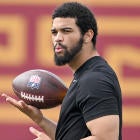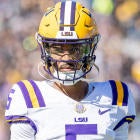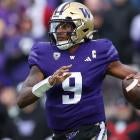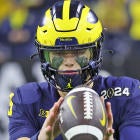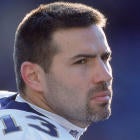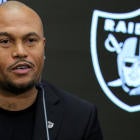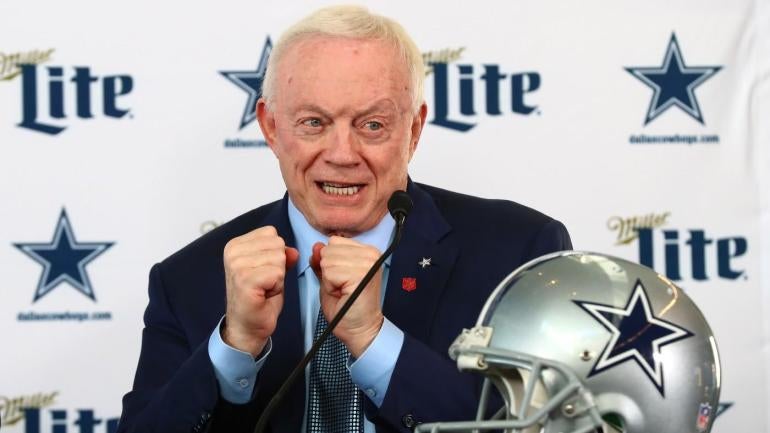
Jerry Jones' Dallas Cowboys have not advanced past the divisional round of the NFC playoffs since Hall of Famers Troy Aikman, Emmitt Smith and Michael Irvin powered Dallas to Super Bowl glory in the 1995 season, and his remarks Tuesday at the Senior Bowl down in Mobile, Alabama shed some light as to what some of the reasons for that drought may be. The Cowboys have gone 12 consecutive playoff runs without reaching the conference championship round, the longest such streak in NFL playoff history.
When asked about how the Los Angeles Rams and Philadelphia Eagles utilized "aggressive offseasons" to represent the NFC in the two most recent Super Bowls, Jones elaborated on his risk tolerance in comparison to those teams in which he compared apples to oranges in lumping the two teams' philosophies together.
"Anybody who thinks I won't take a chance has misread the tea leaves," Jones said. "But I do think longer term, and I'm real hesitant to bet it all for a year. There's a lot of things that can happen for that year. In essence, we're seeing a couple of teams [the Los Angeles Rams and Philadelphia Eagles] that have had some real success putting it all out there and paying for it later. Don't think that doesn't pop in my head end get my eye as far as doing it, and I know how to do that. It's part of what you put in that computer and what comes out. We'll see how it comes, but that's pretty impressive to have two teams in the last two years empty the bucket and get to the Super Bowl. But if you miss, it's a long go."
"On the other hand, my general experience has been that if you will stay aggressive, I'm talking whether it's on the field or off the field, but you pick your shots with risk-taking, and I've spent a lot of time in my life doing that," Jones continued. "When they cut me open, it will be all those scars, heart attacks, for all those risks I took and the years I spent paying for them. My point is, I do know how to take risks. They are absolutely right. We have been in the middle here for a few years, but I like where we are right now, more in the middle. But given the opportunity, if it would make some sense, I've definitely got some risk-taking in me."
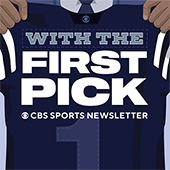
With The First Pick Newsletter
With The First Pick Newsletter
Prepare for the upcoming NFL Draft with the day’s big stories + mock drafts, big board updates and more.
Thanks for signing up!
Keep an eye on your inbox.
Sorry!
There was an error processing your subscription.
Jones was 100% correct when calling the Rams' team-building plan "emptying the bucket": Los Angeles has not had a first-round pick since it traded up 14 spots from 15th overall to the very top pick in the 2016 NFL Draft in order to select quarterback Jared Goff. In order to reach the mountaintop as Super Bowl LVI Champions to conclude the 2021 season, the team needed to clean up when picking in the middle rounds as well as have its big swings via trades and free agency hit, which is what happened.
The team picked up key contributors in the middle to late parts of drafts like Super Bowl MVP and 2021 NFL Offensive Player of the Year, wide receiver Cooper Kupp (third round in 2017), tight end Tyler Higbee (fourth round in 2016), safety Jordan Fuller (sixth round of 2020 Draft), and a variety of linemen on both sides of the ball over the last few years. Then, general manager Les Snead swung for the fences with multi-pick trades for All-Pro cornerback Jalen Ramsey (2019), Pro Bowl quarterback Matthew Stafford (2021) and linebacker Von Miller (2021). Oh, and he happened to select defensive tackle Aaron Donald, one of the greatest defenders in NFL history, 13th overall in the 2014 NFL Draft. Stars like Ramsey, Stafford, Kupp, and Donald were all given lucrative long-term contract extensions in the process of and in the aftermath of leading the team to a Super Bowl title. The Rams themselves admitted they went for broke following the trade for Miller in November of 2021.
We're all in. pic.twitter.com/3Z0ELD11RW
— Los Angeles Rams (@RamsNFL) November 1, 2021
As Jones alluded, they did pay the price for building a top-heavy roster with depth along the margins with mid-to-late round picks elsewhere. And the house of cards collapsed as Stafford, Kupp, and Donald all suffered injures that caused them to miss extensive time, leading to the Rams' 5-12 record in 2022. That's the worst by a defending Super Bowl champion ever. That step backward even led head coach Sean McVay to contemplate retirement at the age of 37 before deciding to continue his coaching career with the Rams this offseason.
However, the Eagles' path to becoming the fourth team ever to reach two Super Bowls in a six-year span with a different quarterback and head coach is vastly different than the "emptying the bucket" moniker Jones labeled them with in his extensive answer on risk-taking as an NFL team executive. The Eagles have completely turned over their roster since their Super Bowl LII championship in the 2017 season with the exception of seven on their current 53-man roster: three offensive linemen, two defensive linemen and two special teams players. That type of roster churn highlighted a willingness to part with key veterans who led them to past glory and/or put up big numbers, something Jones can sometimes be reluctant to do.
Players on Eagles roster from 2017 Super Bowl team
- C Jason Kelce
- RG Isaac Seumalo
- RT Lane Johnson
- DE Brandon Graham
- DT Fletcher Cox
- K Jake Elliott
- LS Rick Lovato
Unlike the Rams, who are currently projected to be about $14 million over the salary cap (according to OverTheCap.com) and who don't have their own first-round pick again until 2024, the Eagles' roster re-shuffle has been done predominantly through the draft and not the pick-emptying trades that have become a signature of Les Snead's Rams.
Only eight of the Eagles' 22 offensive and defensive starters haven't been acquired through the draft or undrafted free agency. Three of those eight -- linebacker Haason Reddick (16.0 sacks, tied for second-most in NFL with Myles Garrett in 2022), wide receiver A.J. Brown (his 1,496 receiving yards are fourth-most in the NFL in 2022 and broke the Eagles' single-season record), and cornerback Darius Slay (made Pro Bowls in each of last two seasons) -- are under contract through at least the 2023 season. Philadelphia currently has about $4 million in cap space (according to OverTheCap.com) and is one of two teams in the upcoming 2023 draft that simultaneously made the playoffs this season and have multiple first-round picks, including one in the top 10. The Seattle Seahawks, who extracted three players and five picks when sending quarterback Russell Wilson to the Denver Broncos, are the other such team. In short, the Eagles have threaded the needle between winning now as well as being built for success in the future. Thus, possessing a contrasting long-term outlook than the Rams.
Starters on Eagles roster acquired through free agency or trades (excluding undrafted free agency)
| Player | Acquisition Method (Year) | Details |
|---|---|---|
WR A.J. Brown* | Trade (2022) | Sent first-round pick (18th overall) and third-round pick (101st overall) to Titans |
Free Agency (2020) | Signed 3-year, $39M contract | |
LB Haason Reddick* | Free Agency (2022) | Signed 3-year, $45M contract |
LB Kyzir White | Free Agency (2022) | Signed 1-year, $3M contract |
CB Darius Slay* | Trade (2020) | Sent third-round and fifth-round picks to Lions |
S C.J. Gardner-Johnson | Trade (2022) | Sent 2023 fifth-round pick and 2024 sixth-round pick to Saints |
Waivers (2019) | Claimed off waivers after being released by Vikings | |
Free Agency (2022) | Signed 1-year, $7.2M contract after being release by Giants |
*Under contract through at least 2023 season
Jones is right about one thing: he has shown a propensity to take risks, but unlike some of the Rams' and Eagles' calculated ones, his have not yet hit to the same degree over the last few years. Signing running back Ezekiel Elliott to a six-year, $90 million contract extension when he held out of training camp in Cabo with two years left on his rookie deal in 2019 was a risk that didn't quite hit, as he has declined in each year of the deal. Trading four-time Pro Bowl wide receiver Amari Cooper along with a 2022 sixth-round draft pick to the Cleveland Browns for 2022 fifth- and sixth-round picks early this past offseason looked like a massive miscalculation after seeing what other Pro Bowl receivers like Brown, Tyreek Hill, and Davante Adams went for in trades later in the same offseason.
Not to mention the subsequent moves of using the cap space afforded by Cooper's departure to shower 2018 third-round wide receiver Michael Gallup with a five-year, $57.5 million extension despite coming off of a torn ACL and to franchise tag tight end Dalton Schultz. Both of their production in 2022 took a step back in terms of receiving yards, as they each battled through nagging injuries. Meanwhile, Cooper had the second-most receiving yards of his entire career, 1,160, and a career-high nine receiving touchdowns in Year 1 with Cleveland despite catching passes from backup Jacoby Brissett and Deshaun Watson, who had missed a year-and-a-half of NFL football.
Those moves led to the top item of the Cowboys' offseason to-do list being to find a legit, top option in the receiving game to complement budding, second-team All-Pro wideout CeeDee Lamb. Quarterback Dak Prescott desperately needs another option he can trust when dropping back to pass, as evidenced by his co-league-leading 15 interceptions in the 2022 regular season along with Houston Texans quarterback Davis Mills. Prescott became the first player in NFL history to lead or co-lead the NFL in interceptions despite missing five or more games in a season.
Jones is willing to take risks, but he might want to study the Eagles' roster reconstruction from 2018-2022 as a lesson in how to methodically "empty the bucket" for current and future seasons.














